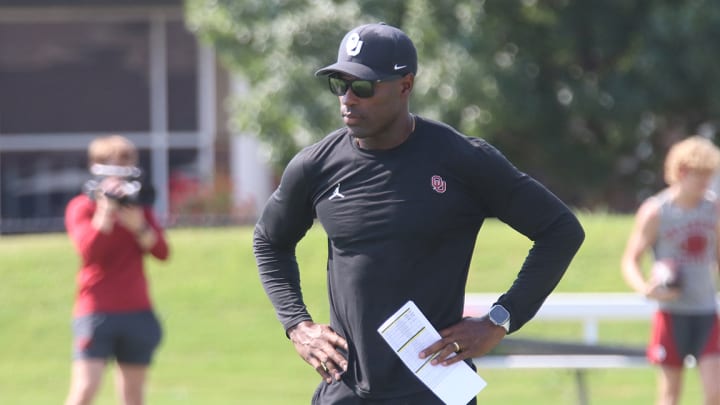NCAA Suspends Oklahoma RB Coach DeMarco Murray for One Game

By Meghan Durham, NCAA Staff
Recruiting violations occurred in the Oklahoma football program when assistant coach DeMarco Murray impermissibly contacted prospects and their families prior to the permissible time period, according to an agreement released by the Division I Committee on Infractions.
Additional violations occurred in the track and field program when former head coach Tim Langford directed a female student-athlete to provide some of her scholarship funds to two student-athletes in the men's track and field program. As a result of the violations in their respective programs, the parties agreed that football head coach Brent Venables and Langford violated head coach responsibility rules.
Violations occurred in Oklahoma football, track and field programs.https://t.co/XcI5OwLMdc
— NCAA News (@NCAA_PR) August 27, 2024
The school, Murray and the enforcement staff agreed that the violations in the football program occurred when Murray impermissibly contacted 17 prospects over 16 months, including 65 impermissible phone calls and 36 impermissible text messages. Murray indicated that he was not aware that a COVID-19 waiver of recruiting contact rules had expired. During the investigation, the enforcement staff determined that the school had properly educated football coaches on the applicable recruiting rules and the timing of changes to them.
Head coaches are presumed responsible for the actions of their staff, and as a result, Venables violated head coach responsibility rules. In this case, however, some of the violations occurred prior to rules changes effective in January 2023 that shifted head coach responsibility rules from a rebuttable presumption to automatic. Because Venables was not personally involved in the violations and demonstrated that he promoted an atmosphere of compliance and monitored his staff, Venables rebutted his presumed responsibility for some of the earlier violations. For the same reasons, the parties also agreed that a suspension penalty for Venables was not appropriate.
The school, enforcement staff and Langford agreed that the violations in the track and field program occurred in April 2023 when Langford directed a student-athlete to redistribute a total of $2,020 of her cost-of-attendance increase in scholarship funds to two men's track and field student-athletes ($1,010 was provided to each) to help them pay rent. As a result of the impermissible benefits provided to the student-athletes receiving the funds, those student-athletes went on to compete in four and five competitions, respectively, while ineligible and the men's track and field program exceeded scholarship limits.
In addition to the underlying violations, Langford violated ethical conduct rules when he knowingly arranged for the provision of impermissible benefits. Due to his personal involvement in the violations, Langford also violated head coach responsibility rules.
Following his separation from the university, Langford denied involvement in the violations during an interview with the enforcement staff. However, each of the student-athletes reported hearing Langford on speakerphone providing the directions to the student-athlete as she transferred the funds, and the student-athlete's account reflected the electronic transfers. As a result, the parties agreed that Langford failed to cooperate when he provided false or misleading information.
Finally, the enforcement staff and school agreed that the school promptly disclosed the violations when they were detected and completed a thorough review of the conduct. The school self-imposed recruiting penalties for Murray as the case was processed. Additionally, the enforcement staff determined that the compliance department had adequate monitoring systems relating to phone conversations, but in this case, football recruiting staff had not uploaded the respective prospects' recruiting profiles since they were not yet of recruiting age, and the phone recruiting software included an unavoidable two-month lag in producing phone records.
The parties used ranges identified by the Division I membership-approved infractions penalty guidelines to agree upon Level II-mitigated penalties for the university, Venables and Murray, and Level I-aggravated penalties for Langford. The decision contains the full list of penalties as approved by the Committee on Infractions, including:
* One year of probation.
* A $5,000 fine.
* A one-game suspension for Murray during the 2024 football season.
* A four-year show-cause order for Langford. During the first two years of the show-cause order, Langford is restricted from all athletically related duties, and any employing member school will suspend Langford for 50% of his first season. During the last two years of the show-cause order, Langford is restricted from off-campus recruiting. The show-cause order also requires Langford to attend an NCAA Regional Rules Seminar and restricts his involvement with financial aid offers.
* A reduction in men's track and field scholarships by 0.1 for the 2023-24 season (self-imposed).
* A prohibition against football staff calling the involved prospects during the May 29-June 11, 2022, and April 15-May 31, 2023, periods (self-imposed).
* A 20% reduction in football recruiting days in spring 2023 (self-imposed).
* A prohibition against football staff from calling or corresponding with involved prospects from Aug. 1-31, 2023 (self-imposed).
* A limitation of Murray's 2023 football recruiting days to eight, down from an average 16.4 per recruiting coach (self-imposed).
* A prohibition from off-campus recruiting for Murray during the 2023 fall evaluation period (self-imposed).
* A three-week ban on recruiting phone and electronic correspondence for the football program from Dec. 8, 2024, to March 31, 2025.
* A prohibition against unofficial visits during the first game of the 2024 season.
* A vacation of all team track and field records in which student-athletes competed while ineligible.
Members of the Committee on Infractions are drawn from the NCAA membership and members of the public. The members of the panel who reviewed this case are Kay Norton, president emerita of Northern Colorado and chief hearing officer for the panel; Amy Parsons, president of Colorado State University; and Stephen Madva, attorney in private practice.
